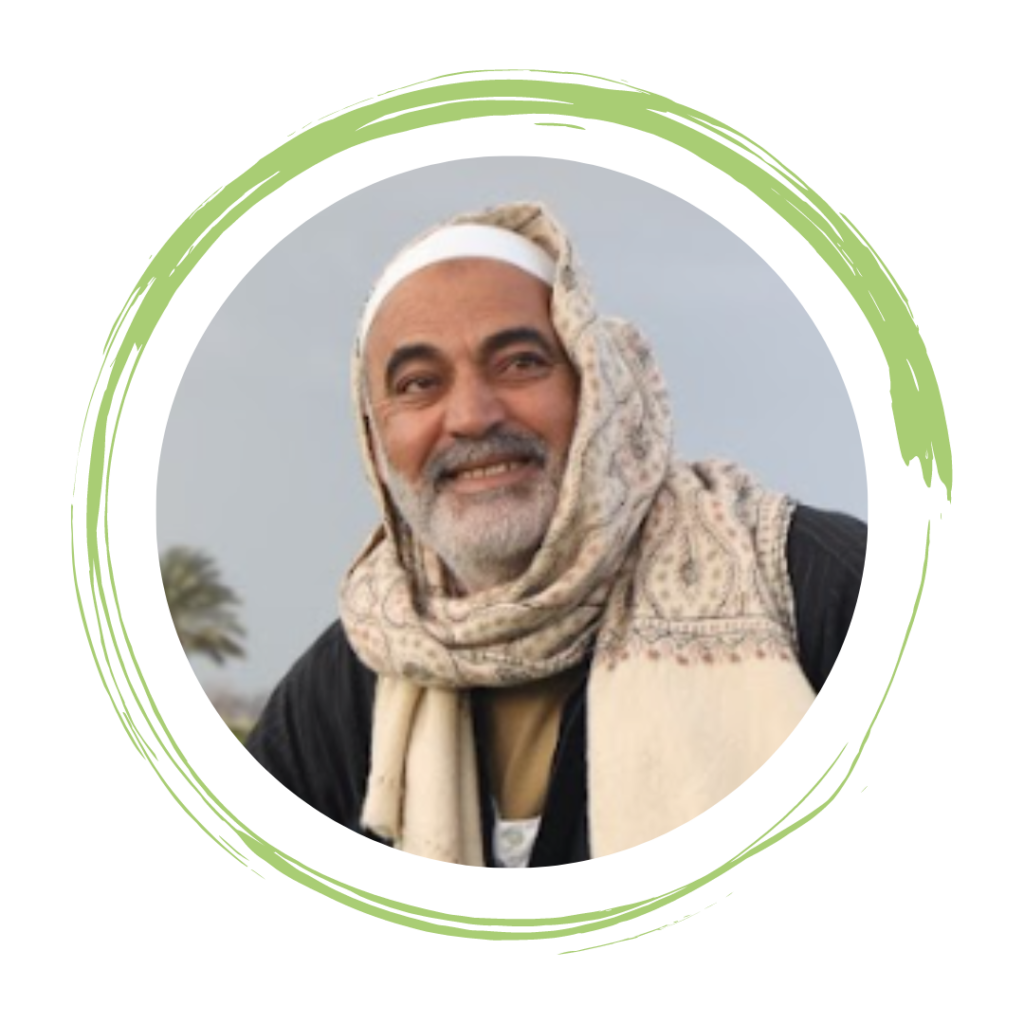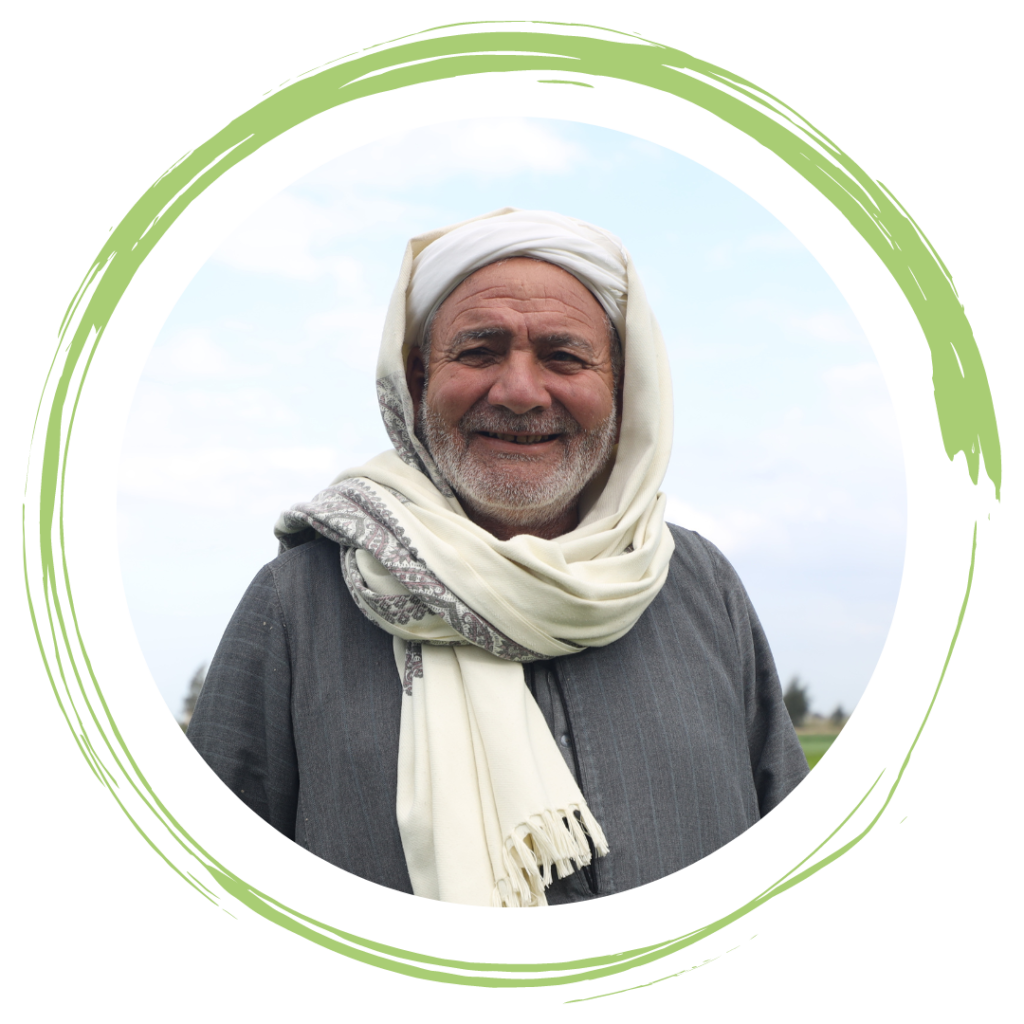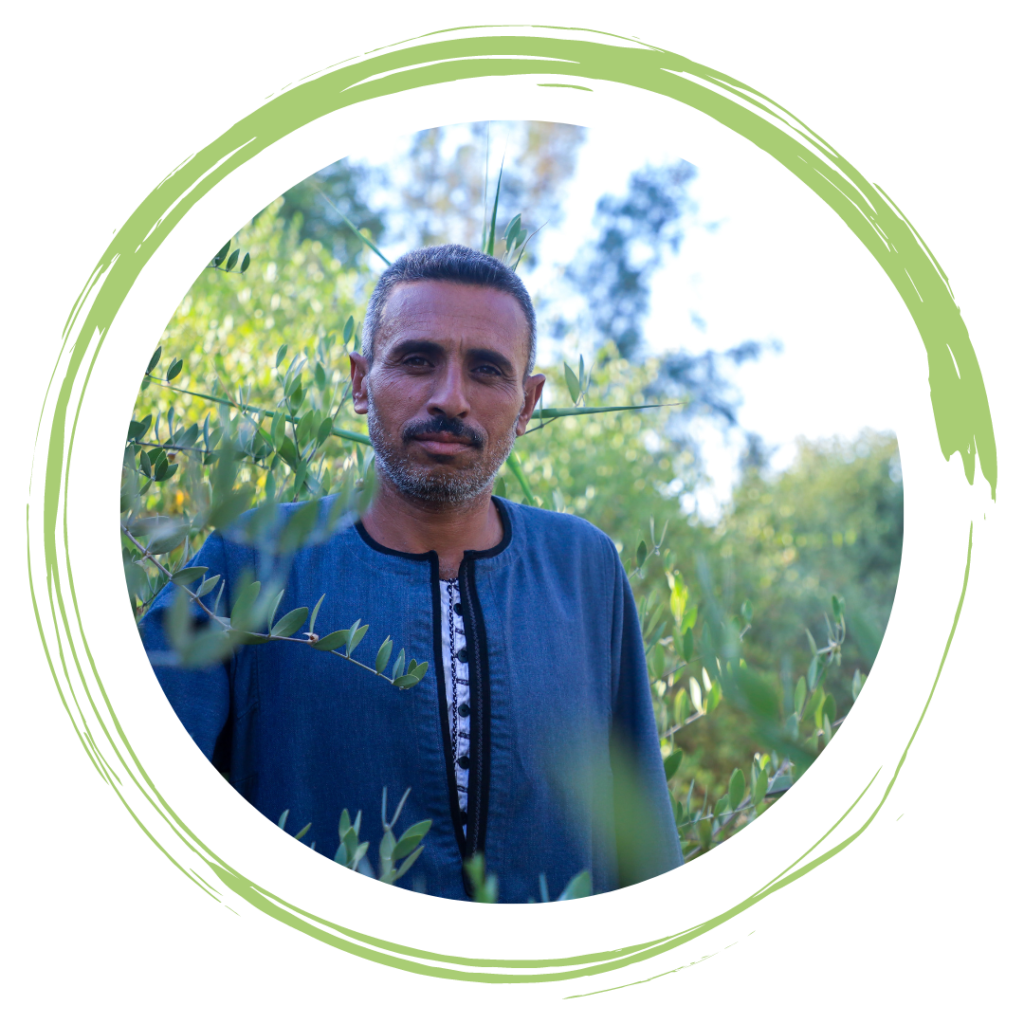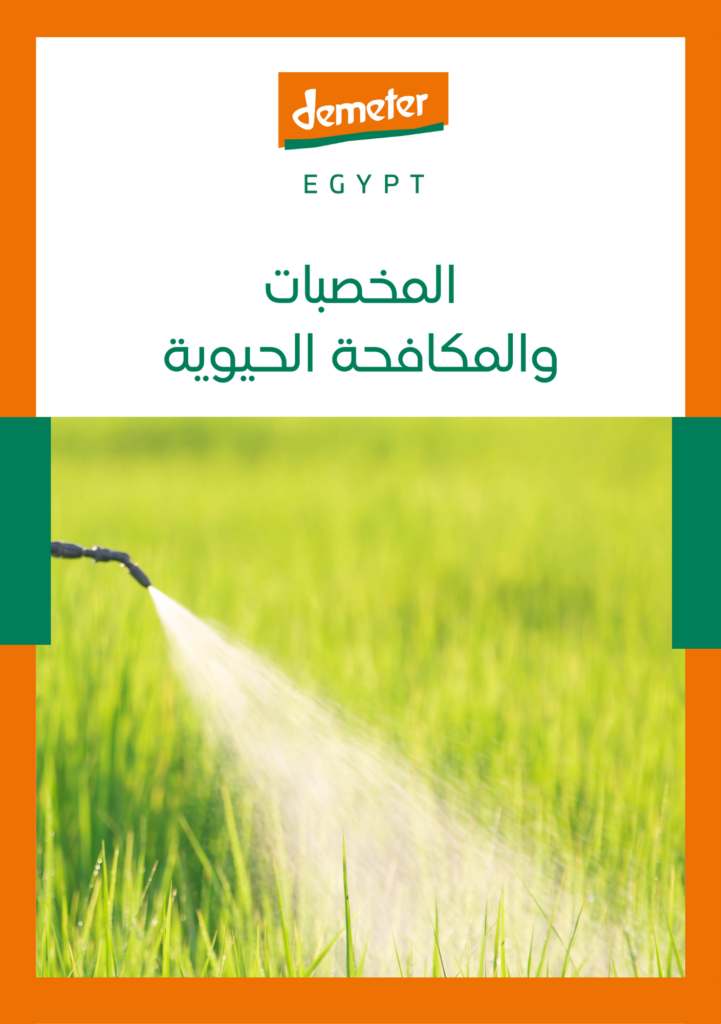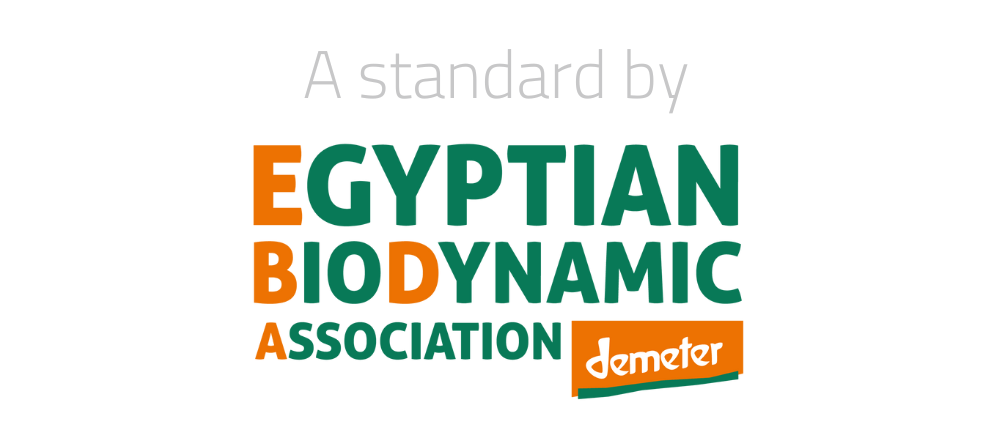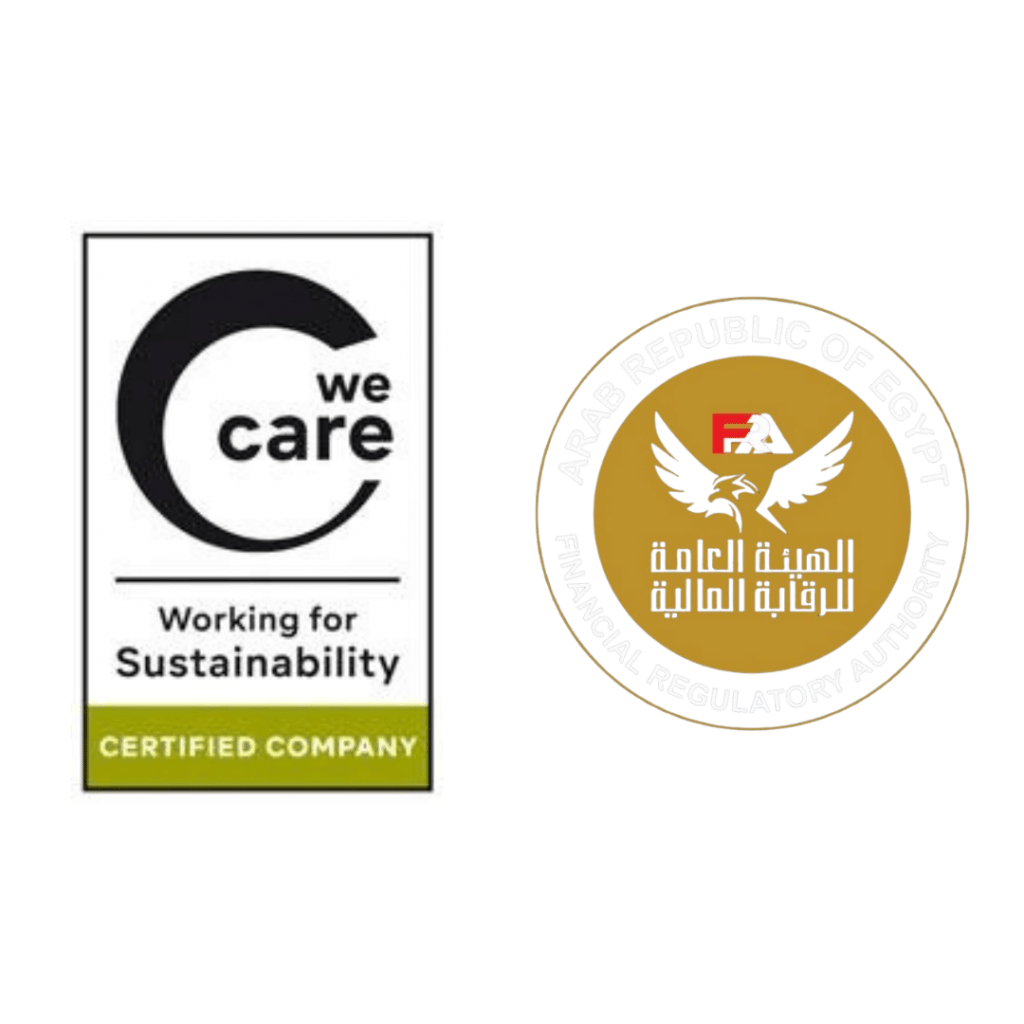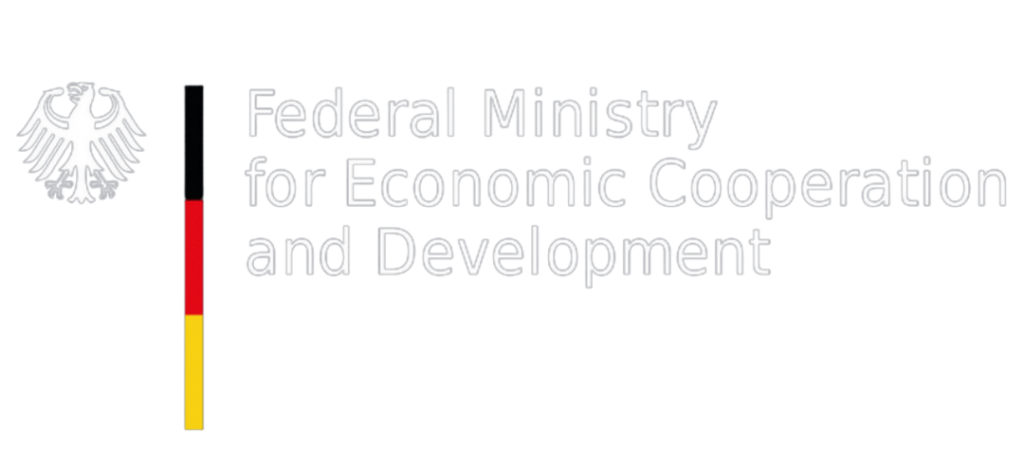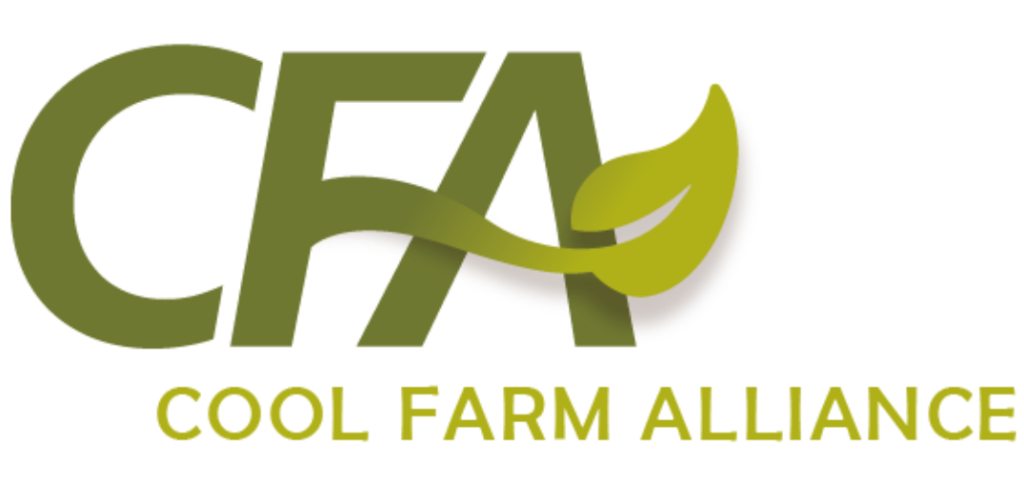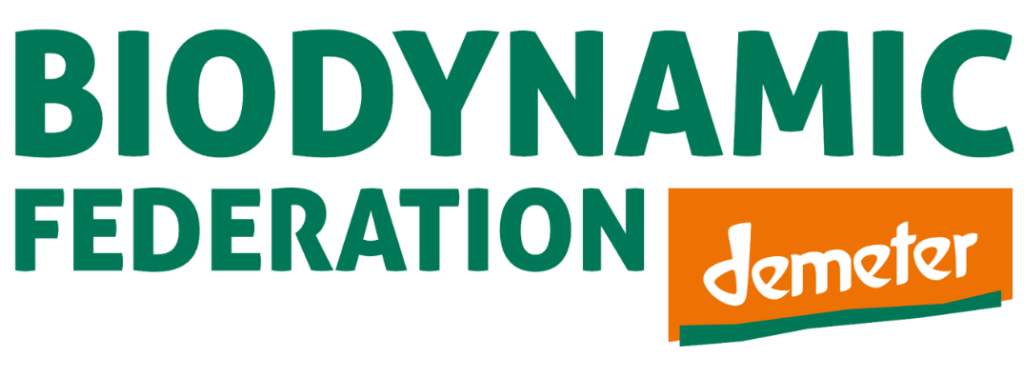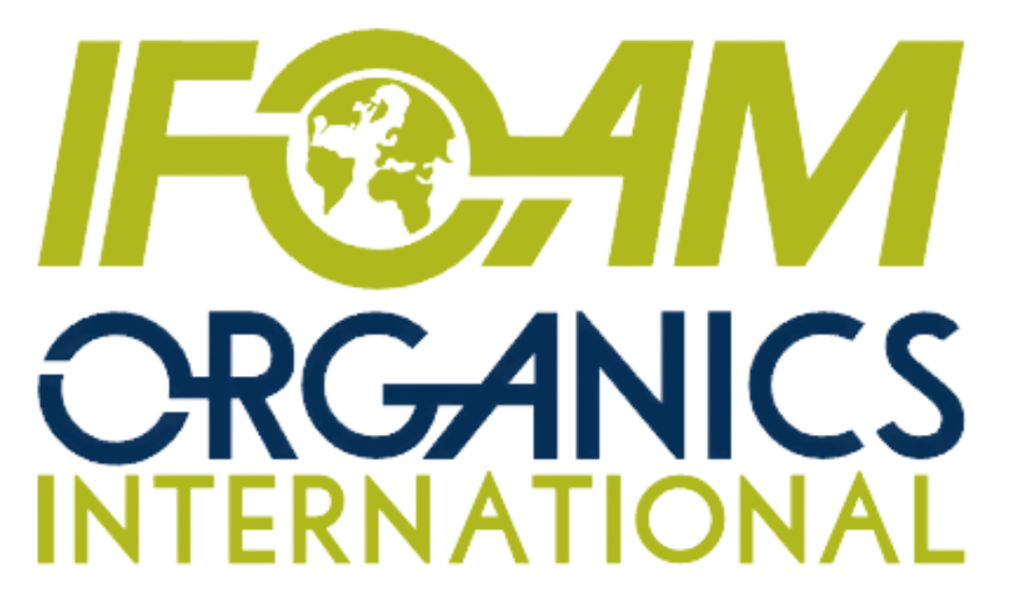
Afforestation Projects

Compost Production

Renewable
Energy

Soil Carbon Sequestration
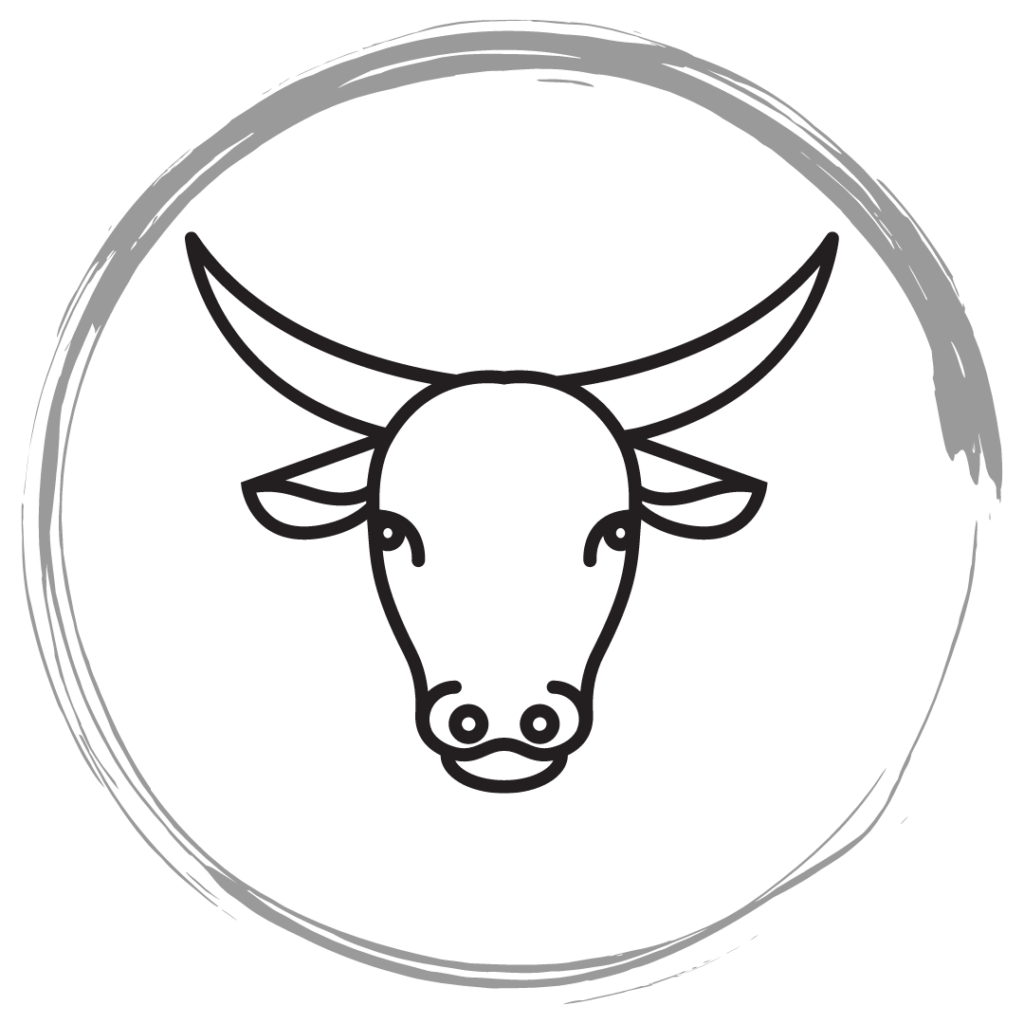
Livestock
The Economy of Love Standard uses verified assessment tools to collect data on the number of carbon emissions, sequestration, or avoidance. It allows the EoL to sell carbon credits under verified conditions. To ensure that a farm meets all Economy of Love criteria, the following key requirements have to be met:
How it Works
Net carbon removal= CR baseline – CR total- GHG
EoL Afforestation & Reforestation Requirements

The above-ground biomass and the below-ground biomass are measured through the methods of the Clean Development Mechanism CDM (IPCC Guidelines). For planting and assessment of new trees, the “Guide to Good Practice for Land Use – Land Use Change and Forestry” (GPG-LULUCF) is used. The estimated carbon stock depends on the average carbon sequestration on the licensee farm during the crediting period. For Afforestation/Reforestation (A/R) EoL counts a crediting period of a minimum of 30 years and a maximum of 50 years. The amount of carbon sequestration depends on the estimated growth rate of the trees during the crediting period of the EoL licensee. Yearly forest inventory should be done to update the carbon model and accordingly adapt the growth rate. The estimated carbon stock is calculated according to every tree species by the use of the IPCC factors. A realistic survival rate should be reflected in the growth model. Replanting of newly planted trees of 10% to 20% is normal in the long-term CO2-Fixation project.
Compost Production

The Economy of Love Licensee will also be encouraged to avoid the production of methane from biomass and other organic matter that would have otherwise been left to decay anaerobically in a solid waste disposal site without methane recovery, partly in uncontrolled dumping sites and partly burnt.
- If the EoL Licensee produces compost on-site, The compost methodolgy regarding; AMS-III.AF.:”Avoidance of methane emissions through excavating and composting of partially decayed municipal solid waste (MSW) — AMS -III.F.:”Avoidance of methane emissions through composting should be applied.
- In case the EoL Licensee buys the compost from outside, the assessment through the CFT would be sufficient.
Renewable Energy

Renewable energy on EoL licensee sites needs to be calculated using the CFT. The baseline emissions are calculated based on the fuel consumption of the technology in use or that would have been used to generate the equivalent quantity of energy.
Soil Carbon Sequestration

Farmers cultivating their land according to organic or biodynamic principles are obliged to use the calculated CFT soil results for the first 20 years after their conversion.
If the licensee cultivated land has already reached the conversion of organic agricultural land for over 20 years, the soil assessment of CFT is not needed anymore. In this case, only the standard soil analysis needs to be submitted to determine the carbon sequestration in the soil and results should be reinserted into the CFT. These soil carbon credits should only be used in the internal farm calculation and not be sold as EoL carbon credits.
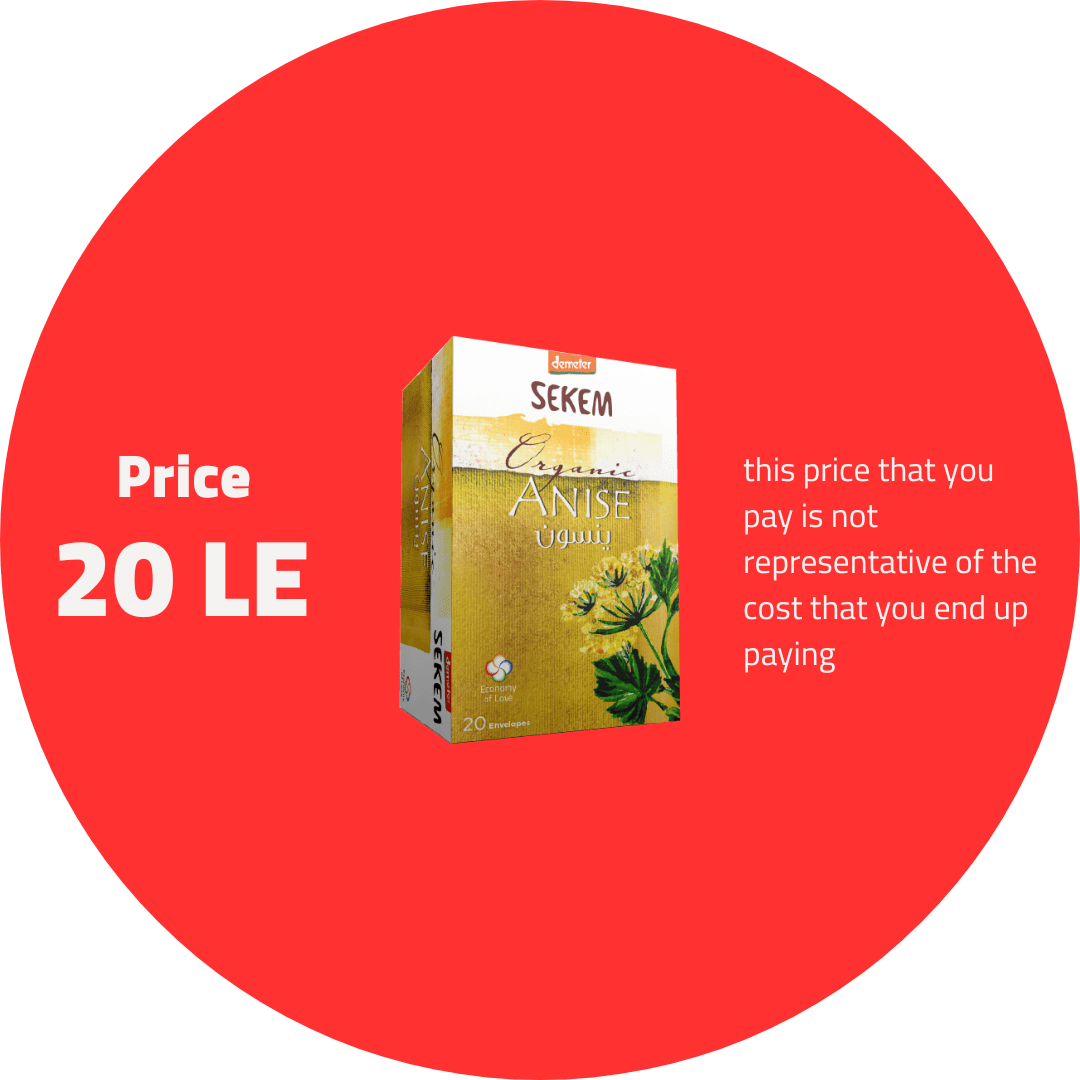
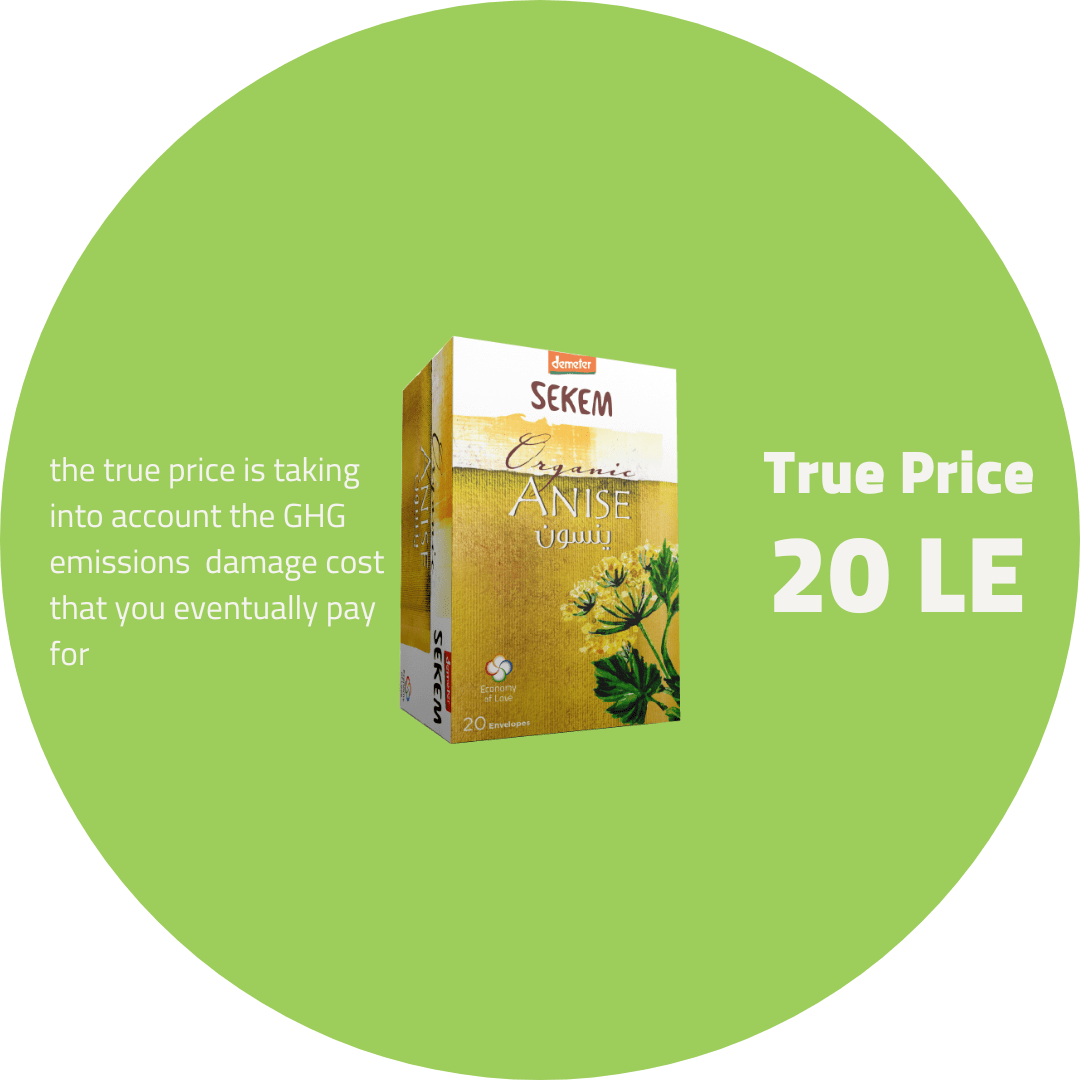


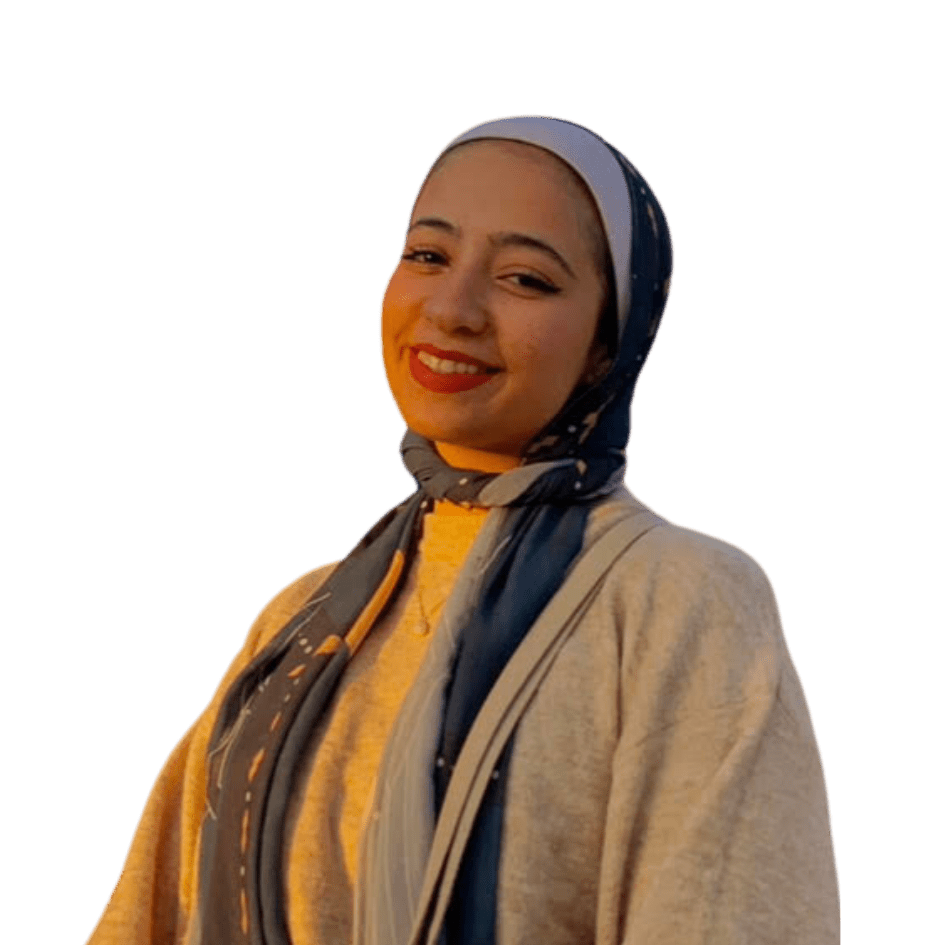

About page (alternative page)
Our Carbon impact partners
End of about page
EoL Participatory Guarantee System (PGS)
PGS EOL is a project initiated by the Egyptian Biodynamic Agriculture Associations (EBDA) and SEKEM, to help farmers start or further improve inclusive biodynamic agriculture and benefit people and the environment while producing their agricultural commodity.
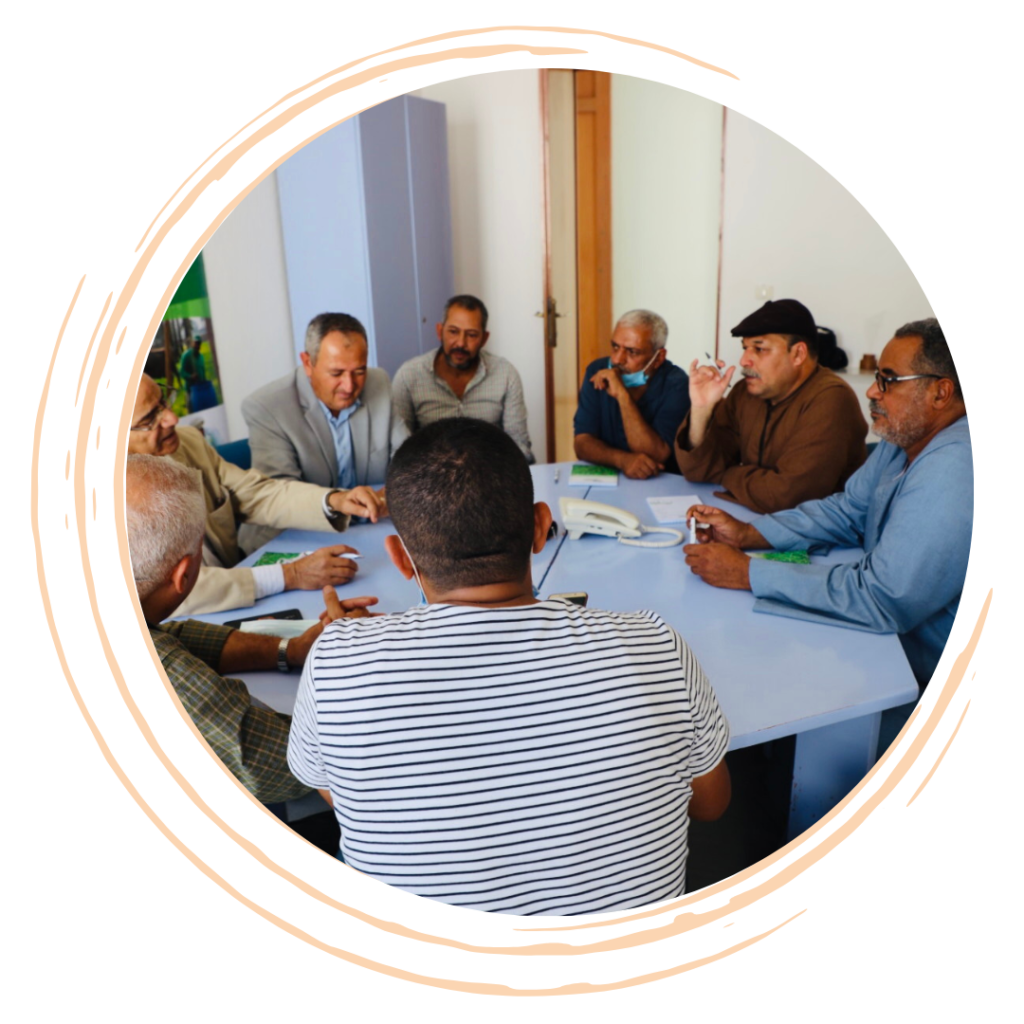
PGS benefits

Knowledge exchange between farmers

Decreasing complexity of documentation

Low entry barriers access to the certification

Promoting direct relationship between farmers

Less cost for producers

Improves communication between farmers and national market
Co-benefit page (alternative page)
Our Approach
Not Just About Carbon
EoL builds on a personal approach to each of our farmers. We understand their needs and provide them with continuous hands-on support.

Supporting
Farmers
The EoL provides support for farmers applying the EoL certification principles on their land. This standard ensures highest production quality through the application of biodynamic agriculture and a continues improvement in sustainability, ethics and cultural activities.
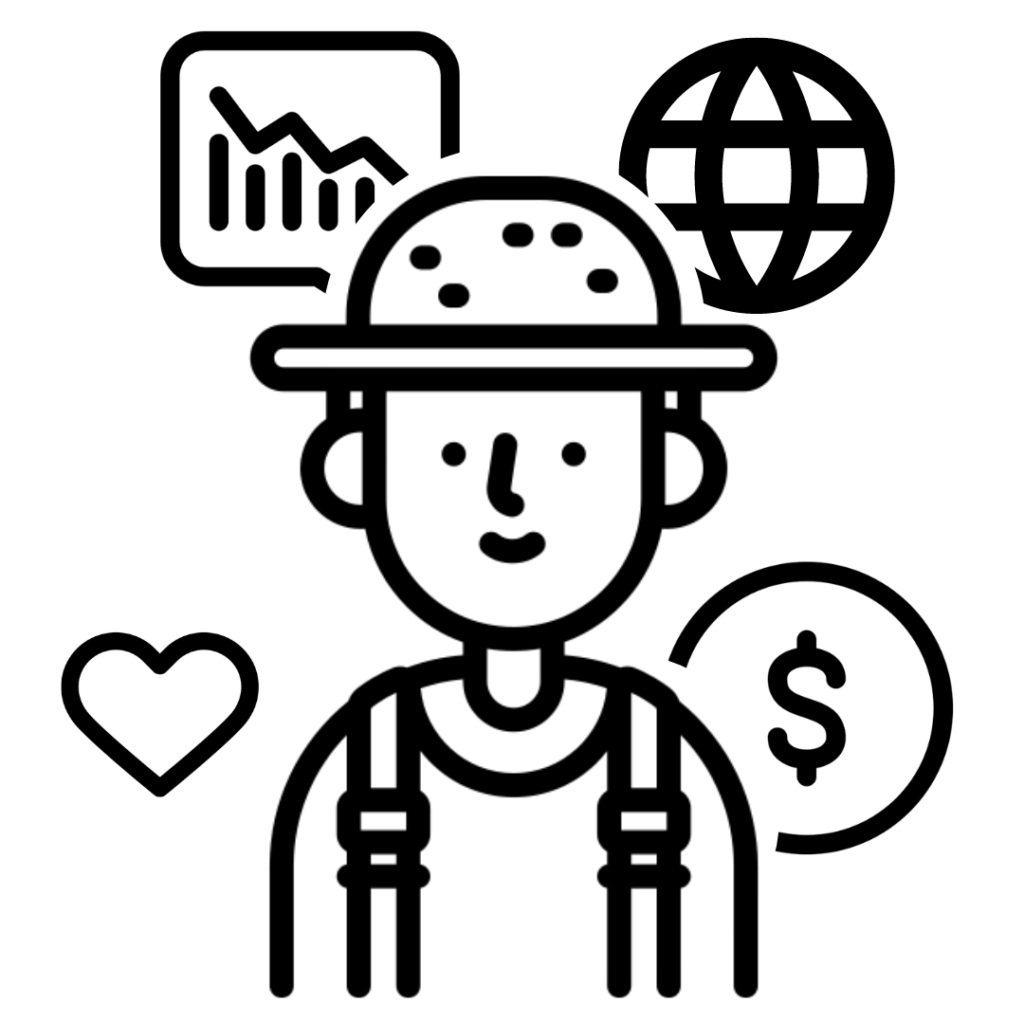
Access to International Markets
After receiving the EoL certification, farmer’s product can be marketed through the unique Economy of Love network. A new and additional benefit of the certification is the EoL carbon credit scheme which the farmer can access. This provides for an additional income considering the environmental services that our farmers are providing anyways, like: production of compost, afforestation/ reforestation, crop rotation or the use of renewable energy.

Afordability and Transparency
Thanks to the full transparency of our system our customers can be assured that by buying EoL carbon credits they invest in a well-functioning value chain based on solidarity and sustainable agriculture. We believe that everyone should have easy access to healthy and biodynamic nutrition. EoL products’ prices are made competitive and affordable thanks to additional revenue streams from selling carbon credits.
BIODIVERSITY
Human activities are exploiting nature at a rate far greater than it can be replenished. The latest research finds that the balance and functioning of every ecosystem rely on its biodiversity – variability among living organisms from all sources. Biodiversity is considered to be one of the 9 planetary boundaries whose functioning is essential for our human existence.
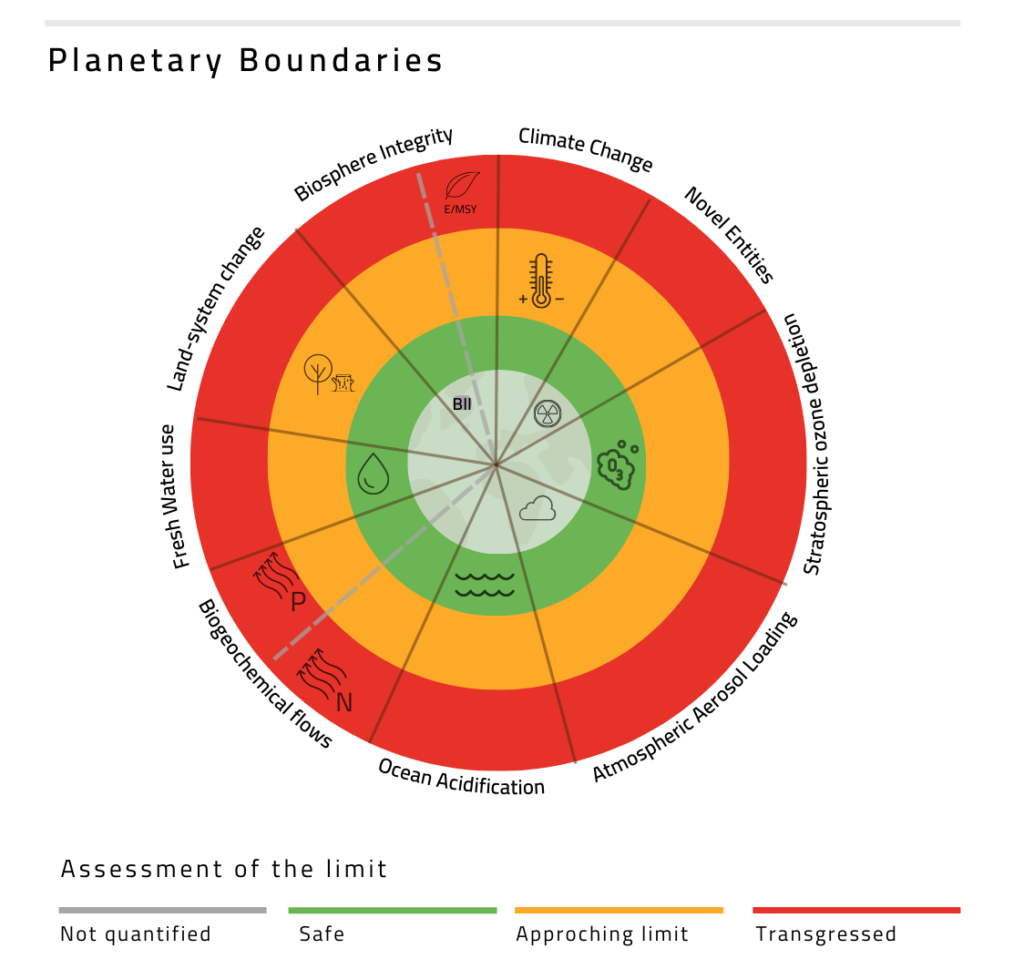
Land-use change is the leading reason for biodiversity loss, while conventional agriculture is the major driver for this change. The EoL together with its partner farmers is devoted to spreading regenerative agriculture practices, which preserve nature and contribute to rich and resilient biodiversity. Applying the method of EoL and biodynamic agriculture implies that 10% of farmer land is dedicated to enhancing and supporting biodiversity. Our approach integrates a sustainable crop mix and crop rotation tailored to local climate conditions.
ABOUT OUR HOLISTIC CARBON CREDITS
Find Our More
Methodologies

As member of the Cool Farm Alliance, we are using the Cool Farm Tool (CFT) for the calculation of the total farm footprint, including all sources of the internal CO2 emissions. In addition to the assessment of the CFT our Standard is assessing data of afforestation & reforestation, compost requirements, renewable energy as well as the soil carbon sequestration. With the help of the CFT it is possible to get a holistic picture of each farm’s impact. The Cool Farm Tool (CFT) covers the five different areas of; tree, compost, renewable energy, soil, and Livestock represented in:

Afforestation Projects

Compost Production

Renewable
Energy

Soil Carbon Sequestration

Livestock
How it Works
The Economy of Love Standard uses verified assessment tools for the collection of data on the number of carbon emissions, sequestration, or avoidance. It allows the EoL to sell carbon credits under verified conditions. To ensure that a farm meets all Economy of Love criteria, the following key requirements have to be met:
behira
The Center of Organic Agriculture in Egypt is validating and verifying the Economy of Love projects based on the EoL project design document prepared by the Carbon Footprint Center.
Assuit
The Center of Organic Agriculture in Egypt is validating and verifying the Economy of Love projects based on the EoL project design document prepared by the Carbon Footprint Center.
Beni Suef
The Center of Organic Agriculture in Egypt is validating and verifying the Economy of Love projects based on the EoL project design document prepared by the Carbon Footprint Center.
Damietta
The Center of Organic Agriculture in Egypt is validating and verifying the Economy of Love projects based on the EoL project design document prepared by the Carbon Footprint Center.
El Wahat El Baharia
The Center of Organic Agriculture in Egypt is validating and verifying the Economy of Love projects based on the EoL project design document prepared by the Carbon Footprint Center.
Faiyum
The Center of Organic Agriculture in Egypt is validating and verifying the Economy of Love projects based on the EoL project design document prepared by the Carbon Footprint Center.
Gharbia
The Center of Organic Agriculture in Egypt is validating and verifying the Economy of Love projects based on the EoL project design document prepared by the Carbon Footprint Center.
Ismailia
The Center of Organic Agriculture in Egypt is validating and verifying the Economy of Love projects based on the EoL project design document prepared by the Carbon Footprint Center.
Kafr El Shiekh
The Center of Organic Agriculture in Egypt is validating and verifying the Economy of Love projects based on the EoL project design document prepared by the Carbon Footprint Center.
Luxor
The Center of Organic Agriculture in Egypt is validating and verifying the Economy of Love projects based on the EoL project design document prepared by the Carbon Footprint Center.
Marsa Matruh
The Center of Organic Agriculture in Egypt is validating and verifying the Economy of Love projects based on the EoL project design document prepared by the Carbon Footprint Center.
Menoufia
The Center of Organic Agriculture in Egypt is validating and verifying the Economy of Love projects based on the EoL project design document prepared by the Carbon Footprint Center.
Minya
The Center of Organic Agriculture in Egypt is validating and verifying the Economy of Love projects based on the EoL project design document prepared by the Carbon Footprint Center.
Minya PGS
The Center of Organic Agriculture in Egypt is validating and verifying the Economy of Love projects based on the EoL project design document prepared by the Carbon Footprint Center.
Qena
The Center of Organic Agriculture in Egypt is validating and verifying the Economy of Love projects based on the EoL project design document prepared by the Carbon Footprint Center.
Sharqia
The Center of Organic Agriculture in Egypt is validating and verifying the Economy of Love projects based on the EoL project design document prepared by the Carbon Footprint Center.
Sohag
The Center of Organic Agriculture in Egypt is validating and verifying the Economy of Love projects based on the EoL project design document prepared by the Carbon Footprint Center.
20%
The EoL Carbon Buffer
The EoL Carbon Buffer, which is a solidary carbon buffer and requires that 20% of the Carbon Credit revenue is being withheld for five years. Every five years, appropriate assessments and evaluations are made on all member farms, and if all calculations meet expectations, the missing amount can be disbursed. In case carbon sequestration is not maintained or carbon is released back into the atmosphere due to an event such as wildfire, unplanned deforestation, termination of a long-term contract, or other changes in management practices, carbon credits calculated to date will be compensated by the solidary carbon buffer (20%). With the
implementation of this safety step, the EoL standard actively guarantees the commitment and the promise of long-term carbon sequestration.
shop page
Offset your Emissions with EoL Carbon Credits

The wide-ranging impacts of climate change are adversely affecting millions of smallholder farmers around the globe, with farmers in Africa suffering the worst of these impacts. Rise in temperatures and extreme weather events, combined with a sharp increase in pests and diseases, are putting the very livelihoods of these farmers at risk.

Much more investment will be needed to provide farmers with the skills and finance they need to adapt to the changing climate. The Egyptian Biodynamic Association developed the ‘Economy of Love (EoL) standard and carbon scheme’ to help actively contribute to climate change adaptation and mitigation. This standard uses an internationally recognized UNFCCC model to measure how much CO2 is emitted on EoL-certified farms and how much carbon is sequestered.
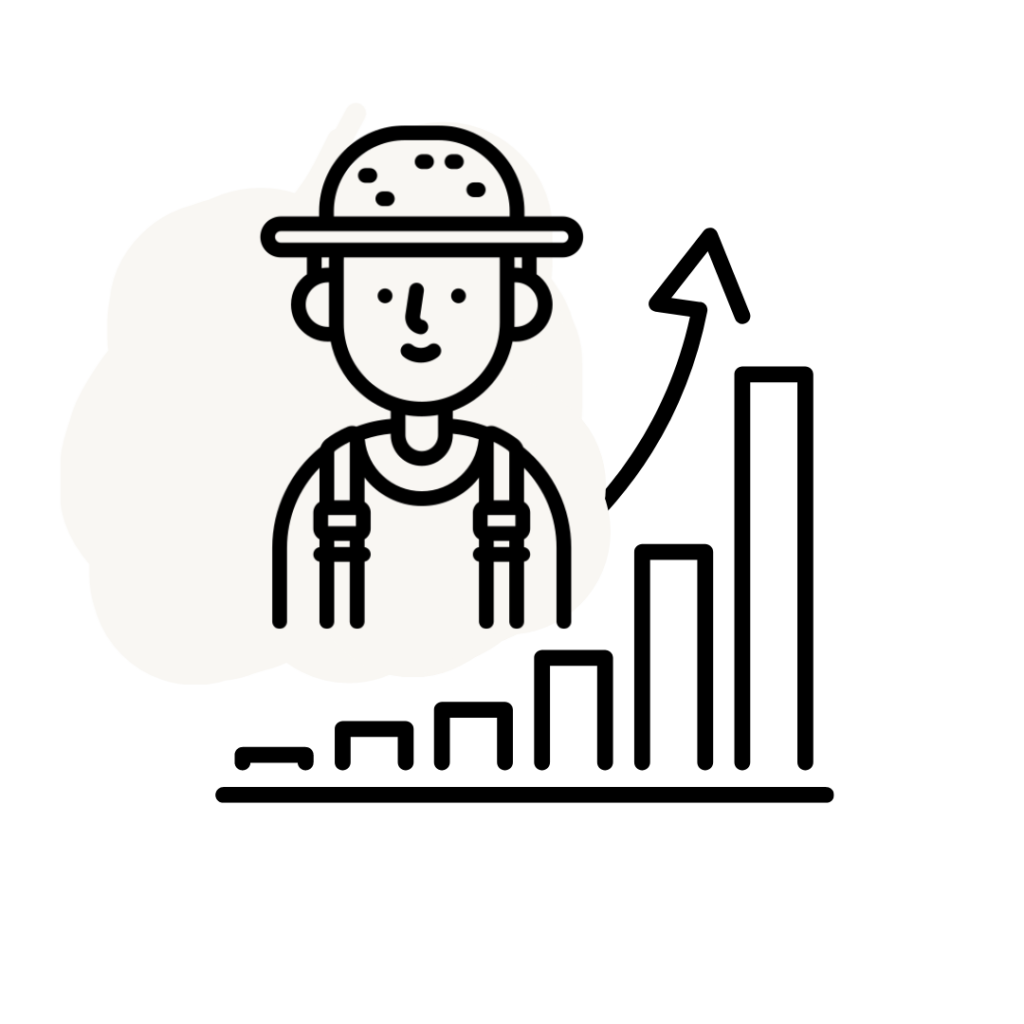
To date, the EoL carbon scheme has helped motivate 2100 farmers in Egypt to plant more trees, increase compost production, improve soil fertility through regenerative agriculture, and promote the introduction of renewable energy on small-scale farms.
The Impact of One Carbon Credit
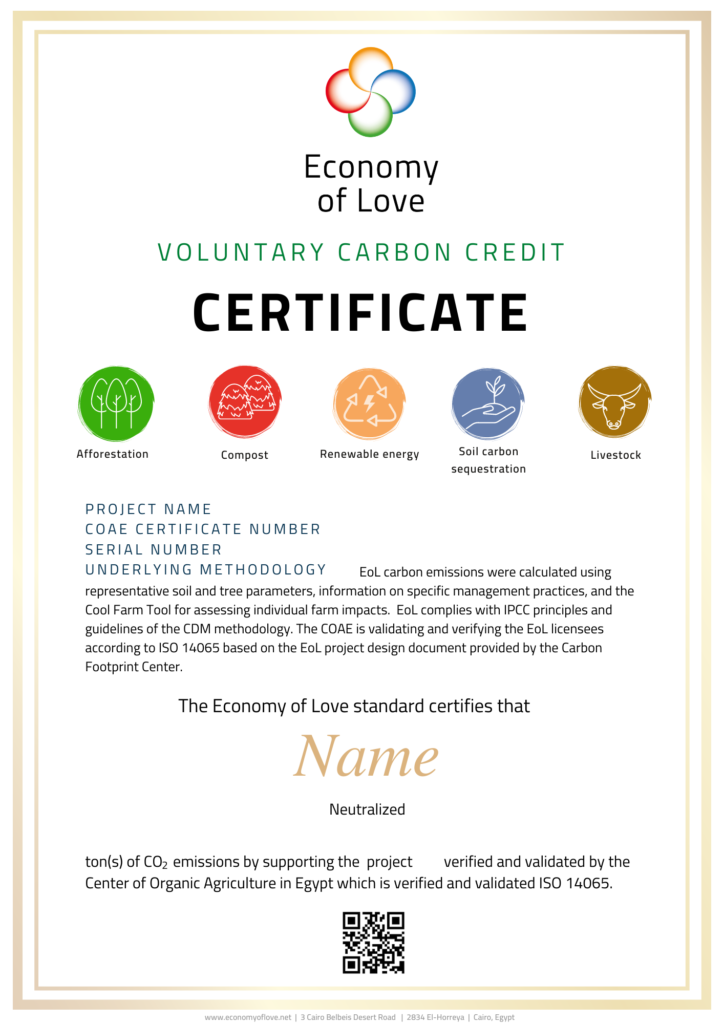
With 1 EoL Carbon credit, you offset 1 ton of CO2e through:
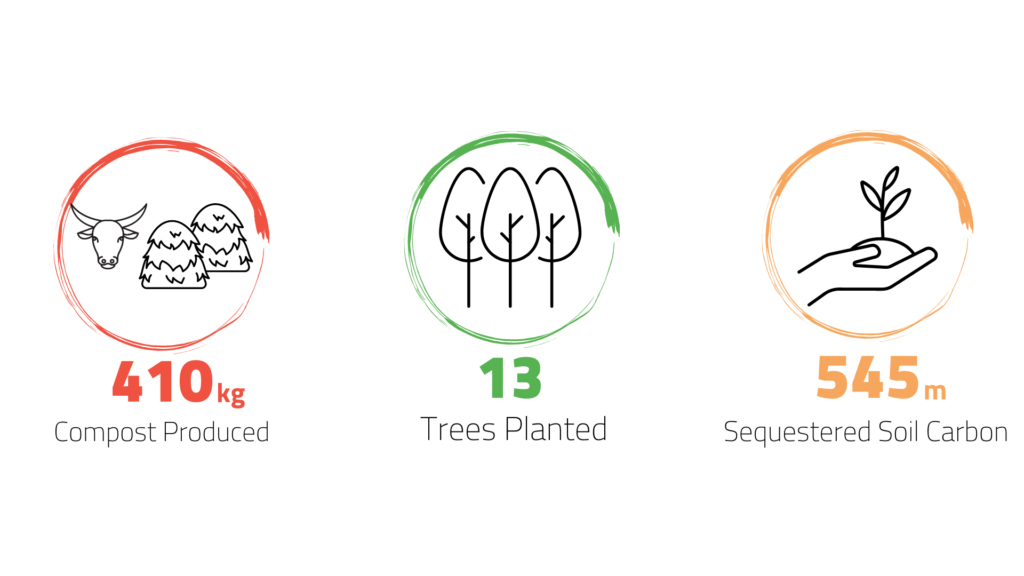
*The data shown are based on average numbers as an example only. Every farm has its own mix for generating carbon credits.
€35.00
Per One Credit
*incl total VAT
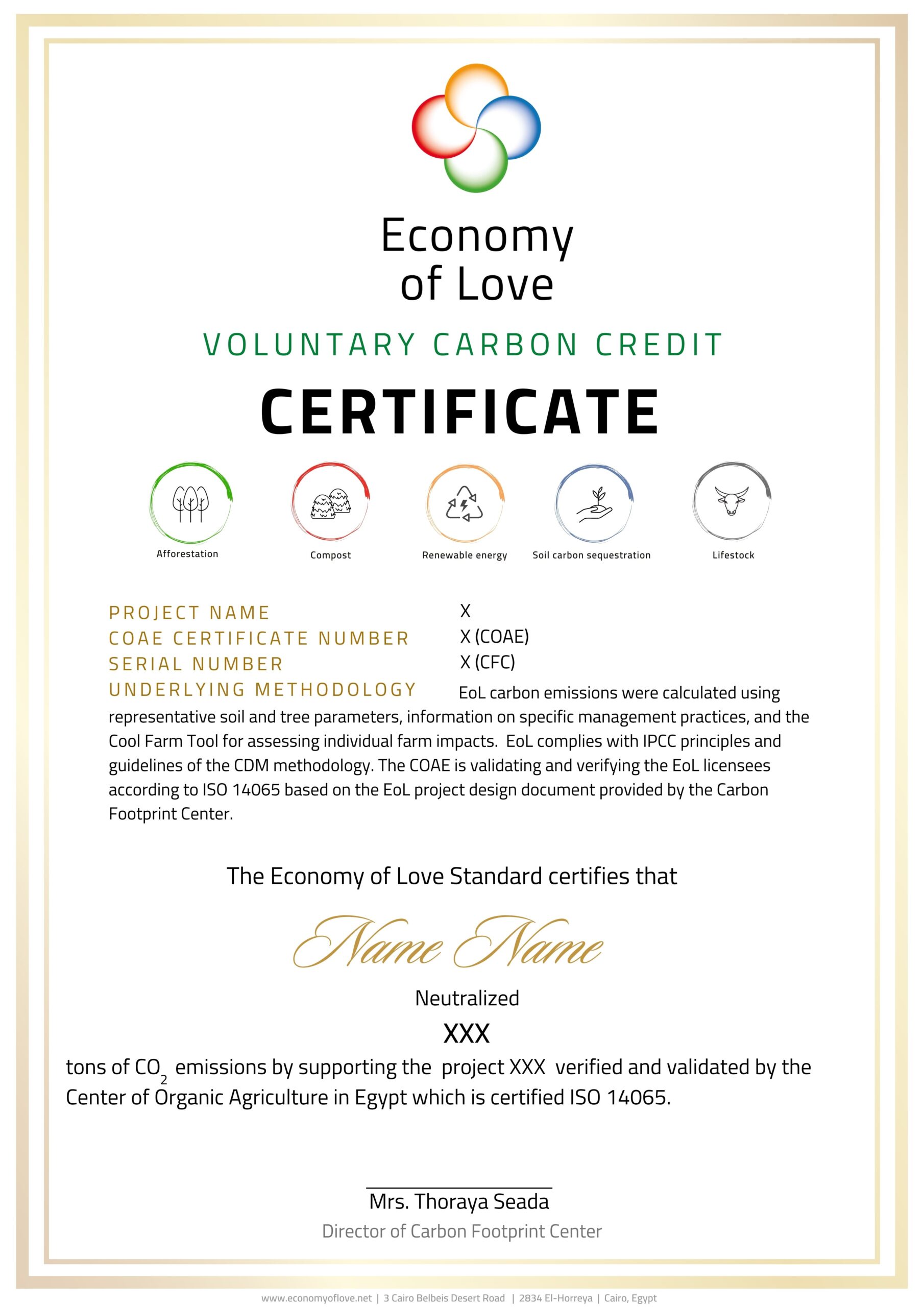
€35.00 per 1 credit
*incl total VAT
Offset your emissions with EoL Carbon Credits
With 1 EoL Carbon credit, you offset 1 ton of CO2e through:

13
trees planted

545 m
of soil carbon sequestered
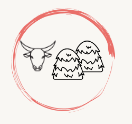
410 kg
compost produced
*the data shown is based on average numbers as an example only. Every farm has its own mix for generating carbon credits.
Holistic Approach
Economy of Love proves to be the most holistic carbon credit scheme
EoL covers all 4 dimensions of sustainable development: society, economy, culture, and environment. Thanks to our network of producers, buyers and certifiers, EoL is able to support biodynamic farmers and produce of products with a positive impact, while sequestering net carbon and enhancing farm biodiversity. The Standard aims to create a system that serves the global community by taking into account the living conditions of future generations. To do so, EoL commits to develop local communities through education, art and creation of fair and dignified working conditions. EoL ensures that every carbon project validated and verified by our standard is transparent, follows the true cost accounting approach and covers living wages of the workers along the value chain.
Our development dimensions

Culture
read more
Cultural Criteria Overview
- Factory supervisors and managers receive training to create space for cultural events.
- Conducting regular creative activities with employees.
- Respecting the local traditions/culture of the employees.
- Learning and encouragement individual well-being and self-development/creative expression.
- Working with local initiatives and enhance cultural activities.

Society
read more
Social Criteria Overview
- Providing fair and dignified working conditions.
- Providing employees with health & social insurance.
- Engaging with stakeholders through round tables.
- Ensuring a sustainable impact on and engagement with the local community.
- Employees receive awareness training on social topics.

Environment
read more
Environmental Criteria Overview
- Following Biodynamic production/processing standards.
- Reducing packaging and using recycled material.
- Implementing sustainable water and waste management systems.
- reporting on Greenhouse Gas (GHG) Emissions.
- Employees receive ecological awareness trainings.

Economy
read more
Economical Criteria Overview
- Providing data to conduct full cost accounting.
- establishing solidarity agreement between stakeholders.
- Providing wages that allow for a decent standard of living.
- Creating transparency in stakeholder relationships.
- Employees receive sustainable-economic awareness trainings.
Our approach
After receiving the EoL certification, farmer’s product can be marketed through the unique Economy of Love network. A new and additional benefit of the certification is the EoL carbon credit scheme which the farmer can access. This provides for an additional income considering the environmental services that our farmers are providing anyways, like: production of compost, afforestation/ reforestation, crop rotation or the use of renewable energy.
That’s not all! Thanks to the full transparency of our system our customers can ensure themselves that by buying EoL carbon credits they invest in a well-functioning value chain based on solidarity and sustainable agriculture. We believe that everyone should have easy access to healthy and biodynamic nutrition. EoL products’ prices are made competitive and affordable thanks to additional revenue streams from selling carbon credits.
EoL builds on a personal approach to each of our farmers. We understand their needs and provide them with continuous hands-on support.
Biodiversity
Human activities are exploiting nature at a rate far greater than it can be replenished. The latest research finds that the balance and functioning of every ecosystem rely on its biodiversity – variability among living organisms from all sources.
Biodiversity is considered to be one of the 9 planetary boundaries whose functioning is essential for our human existence. Land-use change is the leading reason for biodiversity loss, while conventional agriculture is the major driver for this change. The EoL together with its partner farmers is devoted to spreading regenerative agriculture practices, which preserve nature and contribute to rich and resilient biodiversity. Applying the method of EoL and biodynamic agriculture implies that 10% of farmer land is dedicated to enhancing and supporting biodiversity. Our approach integrates a sustainable crop mix and crop rotation tailored to local climate conditions.
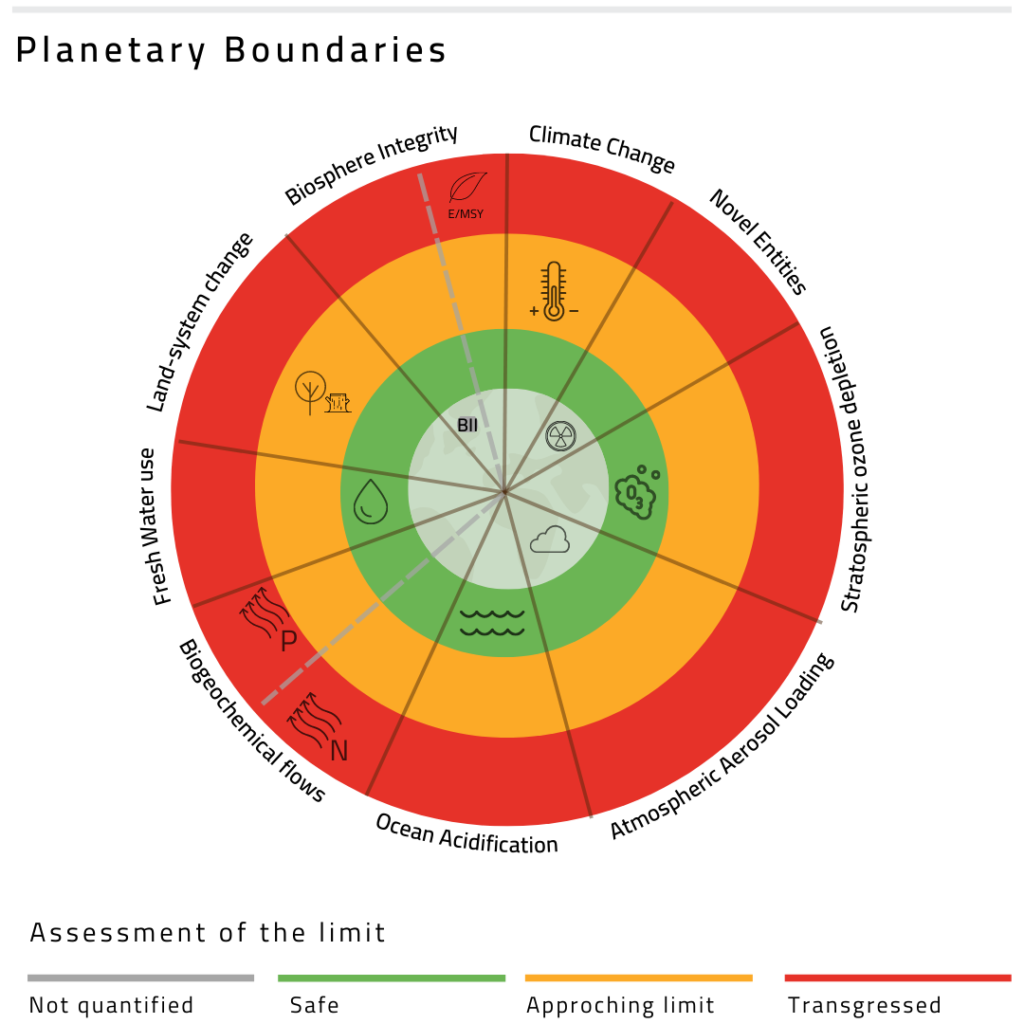
Holistic Approach
Economy of Love proves to be the most holistic carbon credit scheme
EoL covers all 4 dimensions of sustainable development: society, economy, culture, and environment. Thanks to our network of producers, buyers and certifiers, EoL is able to support biodynamic farmers and produce of products with a positive impact, while sequestering net carbon and enhancing farm biodiversity. The Standard aims to create a system that serves the global community by taking into account the living conditions of future generations. To do so, EoL commits to develop local communities through education, art and creation of fair and dignified working conditions. EoL ensures that every carbon project validated and verified by our standard is transparent, follows the true cost accounting approach and covers living wages of the workers along the value chain.
Our development dimensions

Culture
read more
Cultural Criteria Overview
- Factory supervisors and managers receive training to create space for cultural events.
- Conducting regular creative activities with employees.
- Respecting the local traditions/culture of the employees.
- Learning and encouragement individual well-being and self-development/creative expression.
- Working with local initiatives and enhance cultural activities.

Society
read more
Social Criteria Overview
- Providing fair and dignified working conditions.
- Providing employees with health & social insurance.
- Engaging with stakeholders through round tables.
- Ensuring a sustainable impact on and engagement with the local community.
- Employees receive awareness training on social topics.

Environment
read more
Environmental Criteria Overview
- Following Biodynamic production/processing standards.
- Reducing packaging and using recycled material.
- Implementing sustainable water and waste management systems.
- reporting on Greenhouse Gas (GHG) Emissions.
- Employees receive ecological awareness trainings.

Economy
read more
Economical Criteria Overview
- Providing data to conduct full cost accounting.
- establishing solidarity agreement between stakeholders.
- Providing wages that allow for a decent standard of living.
- Creating transparency in stakeholder relationships.
- Employees receive sustainable-economic awareness trainings.
Our approach
After receiving the EoL certification, farmer’s product can be marketed through the unique Economy of Love network. A new and additional benefit of the certification is the EoL carbon credit scheme which the farmer can access. This provides for an additional income considering the environmental services that our farmers are providing anyways, like: production of compost, afforestation/ reforestation, crop rotation or the use of renewable energy.
That’s not all! Thanks to the full transparency of our system our customers can ensure themselves that by buying EoL carbon credits they invest in a well-functioning value chain based on solidarity and sustainable agriculture. We believe that everyone should have easy access to healthy and biodynamic nutrition. EoL products’ prices are made competitive and affordable thanks to additional revenue streams from selling carbon credits.
EoL builds on a personal approach to each of our farmers. We understand their needs and provide them with continuous hands-on support.
Biodiversity
Human activities are exploiting nature at a rate far greater than it can be replenished. The latest research finds that the balance and functioning of every ecosystem rely on its biodiversity – variability among living organisms from all sources.
Biodiversity is considered to be one of the 9 planetary boundaries whose functioning is essential for our human existence. Land-use change is the leading reason for biodiversity loss, while conventional agriculture is the major driver for this change. The EoL together with its partner farmers is devoted to spreading regenerative agriculture practices, which preserve nature and contribute to rich and resilient biodiversity. Applying the method of EoL and biodynamic agriculture implies that 10% of farmer land is dedicated to enhancing and supporting biodiversity. Our approach integrates a sustainable crop mix and crop rotation tailored to local climate conditions.

How To Get Certified
Step 1

Application
Interested companies and farms send a request to apply for the certification through the website
Step 2

Initial Assessment

1-3 months
The farmers or company receive a self-assessment form to fill out and send back to EoL through:
Step 3

Audit

3-12 months
if the company passes the self-assessment then it will be audited by our recognized Certification bodies, to be granted the EoL Certification.
In Transition
If a company does not pass all audits, a transition plan will be created, with the support of EoL. They then can become a level 2 certified member; meaning they can not use the EoL trademark on their products, however, can still benefit from the impacTrace tool.
Step 4

Certification
If all audits are successfully completed the company receives a level 1 certification and has the right to use the trademark, the impacTrace, and the carbon credit – depending on the impact of their farm.

Application
Interested companies and farms send a request to apply for the certification through the website
The farmers or company receive a self-assessment form to fill out and send back to EoL through:

El Salam City, Cairo Governorate 11785

Initial Assessment

1-3 months

Audit

3-12 months
if the company passes the self-assessment then it will be audited by our recognized Certification bodies, to be granted the EoL Certification.
In Transition
If a company does not pass all audits, a transition plan will be created, with the support of EoL. They then can become a level 2 certified member; meaning they can not use the EoL trademark on their products, however, can still benefit from the impacTrace tool.
If all audits are successfully completed the company receives a level 1 certification and has the right to use the trademark, the impacTrace, and the carbon credit – depending on the impact of their farm.

Certification
Check out the EoL Pest Control and Fertilizer Catalog
For Orders and further inquiries please contact +20 1211295517
Interested to know more about the companies above? Click here to download the SEKEM Sustainability Report
| 436 | COAE-ALASSAL-EG431-017 | COAE-ALASSAL-EG431-017-1/436 | COAE-ALASSAL-EG431-017-436/436 |
| 382 | COAE-ELGEZIRA-EG429-015 | COAE-ELGEZIRA-EG429-015-1/382 | COAE-ELGEZIRA-EG429-015-382/382 |
Know more about the EoL-certified farms on the Registry
| Farm Name | Governerate | Certificate Number | Total CC produced until 2023 | project links |
| al assal | Fayoum | COAE/ EG 431 | 436 | https://economyoflove.net/al-assal/ |
| El Gazera | Fayoum | COAE/ EG 429 | 381.7 | https://economyoflove.net/el-ghazira/ |
| el baraka | Sohag | COAE/ EG 200 | 193.6 | https://economyoflove.net/el-baraka/ |
| el metwaly | Fayoum | COAE/ EG 292 | 224.4 | https://economyoflove.net/el-metwaly/ |
| soliman dawood | Fayoum | COAE/ EG 193 | 96 | https://economyoflove.net/soliman-dawood/ |
| Abu Hamad 4 | Fayoum | COAE/ EG 430 | 1063 | https://economyoflove.net/abu-hamad/ |
| Mashhour | Fayoum | COAE/ EG 250 | 478.5 | https://economyoflove.net/mashhor/ |
| El-Feky | Fayoum | COAE/ EG686 013 | 501 | https://economyoflove.net/el-feky/ |
| El Manashee | Fayoum | COAE/ EG432 020 | 378.9 | https://economyoflove.net/el-manashee/ |
| Mahmoud Rabia | Fayoum | COAE/ EG836 021 | 317.9 | https://economyoflove.net/mahmoud-rabia/ |
| Eraky | Fayoum | COAE/ EG488 022 | 504 | https://economyoflove.net/eraky/ |
| Saft | Beni Suief | COAE/ EG660 074 | 145.4 | https://economyoflove.net/saft/ |
| Somosta | Beni Suief | COAE/ EG645 075 | 164.6 | https://economyoflove.net/soomosta/ |
| El-Mostashar | Beni Suief | COAE/ EG672 076 | 124.3 | https://economyoflove.net/el-mostashar/ |
| El-Gazerah | Giza | COAE/ EG625 077 | 167 | https://economyoflove.net/el-gazerah/ |
| Abdalah Saad 1 | Giza | COAE/ EG521 078 | 80.8 | https://economyoflove.net/abdalah-saad-1/ |
| Mandisha | Wahat Bahareia | COAE/ EG48 079 | 217.6 | https://economyoflove.net/mandisha/ |
| El-Rahma | Wahat Bahareia | COAE/ EG458 080 | 178.1 | https://economyoflove.net/el-rahma/ |
| El Sedek | Damietta | COAE/ EG570 081 | 2485 | https://economyoflove.net/el-sedek/ |
| El Zahween | kallubia | COAE/ EG696 082 | 119.6 | https://economyoflove.net/el-zahween/ |
| Al Ghaiash | kafr el sheikh | COAE/ EG448 083 | 818.2 | https://economyoflove.net/al-ghaiash/ |
| El Wady Al Asuti | Asuit | COAE/ EG221 024 | 270.3 | https://economyoflove.net/el-wady-al-asuti/ |
| El Wady Al Asuti 1 | Asuit | COAE/ EG438 025 | 161.4 | https://economyoflove.net/el-wady-al-asuti-1/ |
| osman | Asuit | COAE/ EG783 028 | 80.4 | https://economyoflove.net/osman/ |
| Abdel Ghaffar | Asuit | COAE/ EG440 029 | 534.7 | https://economyoflove.net/abdel-ghaffar/ |
| Manfalout | Asuit | COAE/ EG442 030 | 444.6 | https://economyoflove.net/manfalout/ |
| Bani Oday | Asuit | COAE/ EG441 031 | 500.3 | https://economyoflove.net/bani-oday/ |
| Basateen Aswan | Aswan | COAE/ EG446 032 | 965.7 | https://economyoflove.net/basateen-aswan/ |
| Abdel-Sabour | Aswan | COAE/ EG64 034 | 707.2 | https://economyoflove.net/abdel-sabour/ |
| Abdel Maksoud | Qena | COAE-AB-MAKSOD-EG445- 035 | 302.7 | https://economyoflove.net/abdel-maksod/ |
| El Fangary | Qena | COAE-ELFANGARY-EG444 036 | 312.7 | https://economyoflove.net/el-fangary/ |
| Ismailia | Ismaelia | COAE-ISMAILIA-EG361-037 | 146.6 | https://economyoflove.net/ismailia/ |
| El Baramawy | Ismaelia | COAE-ELBARAMAWY- EG428-038 | 64.4 | https://economyoflove.net/el-baramawy/ |
| El Shirka El Dawlia | Ismaelia | COAE-ELSH-ELDAWLIA- EG427-039 | 94.5 | https://economyoflove.net/el-shirka-el-dawlia/ |
| Mohamed Raslan | Monofia | COAE-MOH-RASLAN- EG410-040 | 206.7 | https://economyoflove.net/mohamed-raslan/ |
| Tawfik Raslan | Monofia | COAE-TAWFIKRASLAN EG817-041 | 247 | https://economyoflove.net/tawfik-raslan/ |
| Abou-Hendawy | Sharkia | COAE-ABouHENDAwY- EG500-023 | 221.6 | https://economyoflove.net/abou-hendawy/ |
| Shlakam | Minia | COAE-SHOULKAM-EG435- 042 | 313.4 | https://economyoflove.net/shoulkam/ |
| Abdalah | Minia | COAE-ABDALAH-EG630-043 | 159.5 | https://economyoflove.net/abdalah/ |
| El-Rouby | Minia | COAE-ELROUBY-EG 622-044 | 222.9 | https://economyoflove.net/el-rouby/ |
| Hassan | Minia | COAE-HASSAN-EG 631-045 | 121.4 | https://economyoflove.net/hassan/ |
| salah | Minia | COAE/ EG434 047 | 185.8 | https://economyoflove.net/salah/ |
| Abdel- Azeem 2 | Minia | COAE/ EG852 048 | 113.6 | https://economyoflove.net/abdel-azeem-2/ |
| EWEES | Minia | COAE/ EG580 049 | 632.6 | https://economyoflove.net/ewees/ |
| ASHNY | Minia | COAE/ EG437 050 | 22.6 | https://economyoflove.net/ashny/ |
| Wady El Zaton | Minia | COAE/ EG436 051 | 399.2 | https://economyoflove.net/wady-el-zaton/ |
| Abo-El-Reish | Behera | COAE-ABOELREISH-EG744- 052 | 534.1 | https://economyoflove.net/abo-el-reish/ |
| Abou-Khateeb | Behera | COAE-ABOUKHATEEB EG266-053 | 581.3 | https://economyoflove.net/abou-khateeb/ |
| Abou Seada | Behera | COAE-ABOUSEADA-EG426- 054 | 417.6 | https://economyoflove.net/abou-seada/ |
| Abou-Madawy | Behera | COAE-ABUMADAWY-EG308- 055 | 935.8 | https://economyoflove.net/abou-madawy/ |
| Abou Moter | Behera | COAE-ABOUMOTER-EG423- 056 | 418.2 | https://economyoflove.net/abou-moter/ |
| El-Bialy | Behera | COAE-ELBIALY-EG739-057 | 371 | https://economyoflove.net/el-bialy/ |
| El Gazera 2 | Behera | COAE-ELGAZERA2-EG420 058 | 405 | https://economyoflove.net/el-gazera-2/ |
| El-Hager | Behera | COAE-ELHAGER-EG686- 059 | 650.2 | https://economyoflove.net/el-hager/ |
| El Zahir | Behera | COAE-ELZAHIR-EG425-060 | 286.3 | https://economyoflove.net/el-zahir/ |
| El-Oroba | Behera | COAE-ELOROBA-EG163-061 | 157.3 | https://economyoflove.net/el-oroba/ |
| El-Askary | Behera | COAE-ELASKARY-EG 736- 062 | 140.5 | https://economyoflove.net/el-askary/ |
| El-Moghazy | Behera | COAE-ELMAGHAZY-EG691- 063 | 177.1 | https://economyoflove.net/el-moghazy/ |
| Badr | Behera | COAE-BADR-EG690-064 | 219.8 | https://economyoflove.net/badr/ |
| Tadros | Behera | COAE-TADROS-EG152-065 | 303.8 | https://economyoflove.net/tadros/ |
| Sallam | Behera | COAE-SALAAM-EG8 18-066 | 332.7 | https://economyoflove.net/sallam/ |
| Tolba Shaheen | Behera | COAE-TOLBASHAHEEN EG421-067 | 336.3 | https://economyoflove.net/tolba-shaheen/ |
| Abdul Fadil | Behera | COAE-ABDELFADEL-EG422 068 | 469.7 | https://economyoflove.net/abdul-fadil/ |
| Awad | Behera | COAE-AWAD-EG738-069 | 115.9 | https://economyoflove.net/awad/ |
| Mobarak El-Sayad | Behera | COAE-SAYAD-EG684-070 | 1236.5 | https://economyoflove.net/mobarak-el-sayad/ |
| Maarouf | Behera | COAE-MAAROUF-EG 689 071 | 208.7 | https://economyoflove.net/maarouf/ |
| Mekled | Behera | COAE-MEKLED-EG 688-072 | 618 | https://economyoflove.net/mekled/ |
| El Tahan | Behera | COAE-ELTAHAN-EG688-073 | 287.7 | https://economyoflove.net/el-tahan/ |
| Sekem(sinai) | Sinai | COAE- SEK-SINAI-EG751 -010 | 2392 | https://economyoflove.net/sekem-sinai/ |
| Sekem (Minia) | Minia | COAE- SEK-MINYA-EG752 -009 | 596 | https://economyoflove.net/sekem-minya/ |
| Ayman | Sharqia | COAE-AYMAN-EG1100-072 | 115.99 | https://economyoflove.net/ayman/ |
| Ayoub | Sharqia | COAE-AYOUB-EG1098-070 | 293.77 | https://economyoflove.net/ayoub/ |
| EL- Hadary | Sharqia | COAE-ELHADARY-EG1108-080 | 13.99 | https://economyoflove.net/el-hadary/ |
| El-Aasar | Sharqia | COAE-ELASAR-EG1103-075 | 51.73 | https://economyoflove.net/el-aasar/ |
| El-Hassan | Sharqia | COAE-ELHASSAN-EG1095-067 | 43.58 | https://economyoflove.net/el-hassan/ |
| El-Masry | Sharqia | COAE-ELMASRY-EG1102-074 | 32.1 | https://economyoflove.net/el-masry/ |
| El-Neis | Sharqia | COAE-ELNEIS-EG1111-083 | 21.49 | https://economyoflove.net/el-neis/ |
| El-Rahman | Sharqia | COAE-ELRAHMAN-EG1106-078 | 21.72 | https://economyoflove.net/el-rahman/ |
| El-Reda | Sharqia | COAE-ELREDA-EG1110-082 | 25.86 | https://economyoflove.net/el-reda/ |
| El-Sayed Fekry | Sharqia | COAE-ELSAYEDFEKRY-EG1104-076 | 37.41 | https://economyoflove.net/el-sayed-fekry/ |
| El-Shorbagy | Sharqia | COAE-ELSHORBAGY-EG1101-073 | 174.71 | https://economyoflove.net/el-shorbagy/ |
| Gelfina | Sharqia | COAE-GELFINA-EG1107-079 | 90.85 | https://economyoflove.net/gelfina/ |
| Karama | Sharqia | COAE-KARAMA-EG1099-071 | 104.98 | https://economyoflove.net/karama/ |
| Khalil | Sharqia | COAE-KHALIL-EG1094-066 | 53.4 | https://economyoflove.net/khalil/ |
| Mahmoud | Sharqia | COAE-MAHMOUD-EG1097-069 | 25.47 | https://economyoflove.net/mahmoud-2/ |
| Mosalam | Sharqia | COAE-MOSALAM-EG1109-081 | 46.93 | https://economyoflove.net/mosalam/ |
| Om El-Nour | Sharqia | COAE-OMELNOUR-EG1093-065 | 73.04 | https://economyoflove.net/om-el-nour/ |
| Reda Mohamed | Sharqia | COAE-REDAMOHAMED-EG1105-077 | 37.14 | https://economyoflove.net/reda-mohamed-2/ |
| Taha | Sharqia | COAE-TAHA-EG1096-068 | 31.3 | https://economyoflove.net/taha/ |
| Company name | Location | impacTrace link |
| Sekem | Egypt | https://economyoflove.net/sekem-products/ |
| Lotus | Egypt | https://economyoflove.net/lotus-product-page/ |
| OGLAND | Sweden | https://economyoflove.net/ogland-products/ |
| NatureTex | Egypt | https://economyoflove.net/naturetex-products/ |
| Agrosourcing | France | https://economyoflove.net/agro-sourcing-products/ |
| Lubs | Germany | https://economyoflove.net/products/lubs-dates/ |





